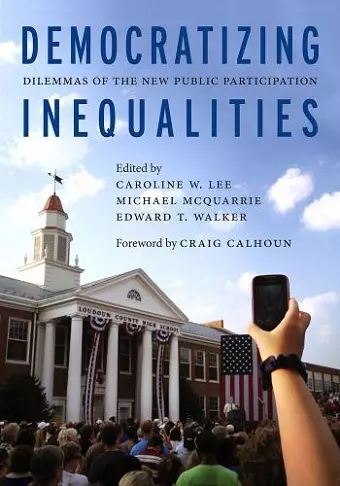Democratizing Inequalities
Dilemmas of the New Public Participation
Michael McQuarrie editor Edward T Walker editor Caroline W Lee editor
Format:Paperback
Publisher:New York University Press
Published:30th Jan '15
Currently unavailable, and unfortunately no date known when it will be back

Opportunities to “have your say,” “get involved,” and “join the
conversation” are everywhere in public life. From crowdsourcing and town hall
meetings to government experiments with social media, participatory politics increasingly
seem like a revolutionary antidote to the decline of civic engagement and the
thinning of the contemporary public sphere. Many argue that, with new
technologies, flexible organizational cultures, and a supportive policymaking
context, we now hold the keys to large-scale democratic revitalization.
Democratizing Inequalities shows that the equation may not be so
simple. Modern societies face a variety of structural problems that limit
potentials for true democratization, as well as vast inequalities in political
action and voice that are not easily resolved by participatory solutions. Popular
participation may even reinforce elite power in unexpected ways. Resisting an
oversimplified account of participation as empowerment, this collection of
essays brings together a diverse range of leading scholars to reveal surprising
insights into how dilemmas of the new public participation play out in politics
and organizations. Through investigations including fights over the
authenticity of business-sponsored public participation, the surge of the Tea
Party, the role of corporations in electoral campaigns, and participatory
budgeting practices in Brazil, Democratizing
Inequalities seeks to refresh our understanding of public participation and
trace the reshaping of authority in today’s political environment.
Democratizing Inequalities is a timely and provocative compilation that demonstrates how participatory practices across a range of expected and unexpected locations cut both waysopening up avenues for citizen engagement while also limiting the democratic potential assumed to follow. The chapters in this volume are a welcome empirical corrective to celebratory discourses of citizen participation, and the book is certain to be an important resource for researchers and practitioners interested in the democratic possibilities of the 'new public participation.' -- Debra Minkoff,author of Organizing for Equality
The authors of Democratizing Inequalities set out to problematize the belief in public participation as a simplistic social good. With this collection of research-based studies and theoretical assessments of the field of participation and democracy studies they have thoughtfully and thoroughly achieved their goal. -- Lynne M. Woehrle ,Mount Mary University * Mobilization *
The book is incredibly timely and deserves attention for its quality of scholarship and for its subject matter. It is an example of how research can both be scholarly and have uses for actors outside of academia. * Contemporary Sociology *
This is an exceptionally timely volume, consistently strong in its individual contributions and coherent in its collective analysis. Democratizing Inequalities both defines a major question for contemporary politicshow and why does political participation matterand advances a convincing contrarian argument. This volume and the questions raised within highlight a vital conversation about political theory and policy that is likely to be with us for many years. -- Elisabeth Clemens,author of The People's Lobby
The volume clearly illustrates the complexities of democracy and deliberative politics. It shows us that, despite participatory processes, we have yet to perfect democracy. The book challenges us to consider whether deliberative processes achieve what we want them to. * Mobilization *
ISBN: 9781479883363
Dimensions: unknown
Weight: 658g
320 pages